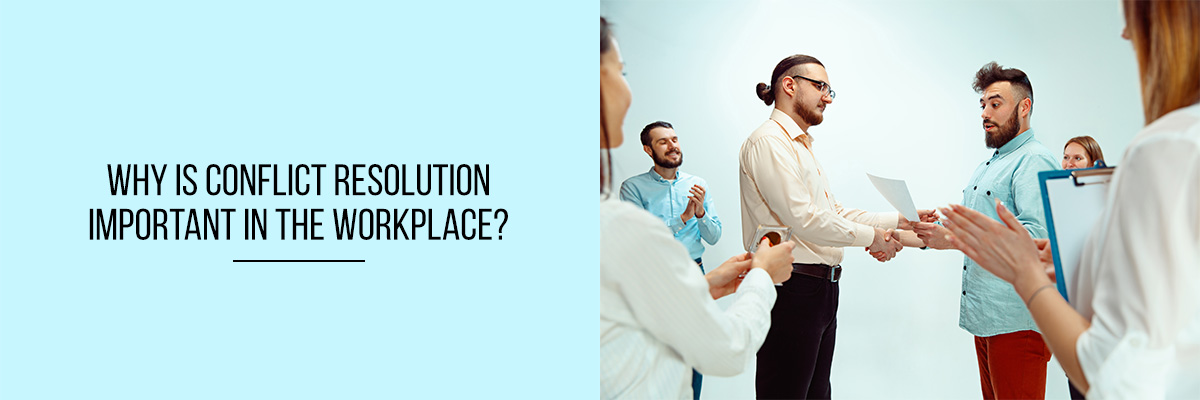The corporate landscape today is fast-paced and competitive, which naturally leads to conflicts. Any workplace can have conflict between colleagues, whether it’s about project management, opinions, or personalities. But what makes successful organizations stand out is their ability to manage and resolve conflicts constructively.
In this blog, we’ll explore the strategies and techniques necessary to teach conflict resolution in the workplace, fostering a culture of collaboration and productivity.



Understanding Conflict in the Workplace
You have to understand the nature of workplace conflicts before you can start figuring out how to resolve them. There are lots of things that can cause conflict, including:
- Communication Breakdowns: There can be conflicts when there are miscommunications, unclear instructions, or bad communication channels.
- Differences in Goals and Values: Sometimes employees have different goals, priorities, or values, causing conflicts over projects.
- Personality Clashes: Team members can clash based on differing personalities, work styles, and approaches.
- Resource Allocation: When limited resources are being contested, such as budgets, manpower, or time, conflicts may arise.
- Organizational Changes: Restructuring, mergers, or changes in leadership can destabilize the workplace, triggering conflicts among employees.
The Importance of Teaching Conflict Resolution
As a manager, you should know what you should do when conflict happens. An effective way of dealing with conflicts is crucial for maintaining a harmonious and productive work environment. Conflicts that are not resolved can lead to:
- Decreased morale and job satisfaction among employees.
- Reduced productivity and efficiency.
- Escalation of conflicts, resulting in workplace tension and hostility.
- Increased employee turnover and absenteeism.
- Damage to the organization’s reputation and brand image.
- By teaching conflict resolution skills, organizations empower their employees to navigate disagreements constructively, fostering teamwork, innovation, and organizational success.
Strategies for Teaching Conflict Resolution
Here are some conflict resolution strategies that you can opt for:
1. Training and Workshops
It’s easy for organizations to conduct regular training on conflict resolution skills. Topics like active listening, empathy, negotiation techniques, and managing emotions during conflicts should be covered. You can let employees practice resolving conflicts in a controlled environment by doing practical exercises and role-playing scenarios.
2. Establishing Clear Communication Channels
Effective communication is the cornerstone of conflict resolution. Organizations should promote open and transparent communication channels, encouraging employees to express their concerns and grievances constructively. Regular team meetings, one-on-one discussions, and feedback sessions provide opportunities for addressing conflicts before they escalate.
3. Implementing Conflict Resolution Policies
By having clear policies and procedures for addressing conflicts, an organization demonstrates its commitment to fostering a respectful and inclusive work environment. These policies must outline the steps for reporting conflicts, the role of supervisors or HR in mediation, and mechanisms for impartially resolving disputes.
4. Encouraging Empathy and Perspective-Taking
When it comes to understanding the underlying causes of conflict and finding mutually beneficial solutions, empathy plays a crucial role. Employers should encourage employees to practice empathy by considering their colleagues’ points of view and feelings. It can be beneficial for team members to engage in empathy-building exercises, such as storytelling or team-building activities.
5. Mediation and Conflict Resolution Training for Managers
The role of managers and team leaders in conflict resolution is crucial. The skills managers need to address conflicts early on can be gained by training in mediation and conflict resolution. They need to be trained in active listening, de-escalation techniques, and negotiation strategies to facilitate constructive dialogue.
6. Promoting a Culture of Collaboration and Respect
Organizations should foster a culture that values collaboration, teamwork, and respect for diverse perspectives. Recognizing and celebrating differences in opinion and encouraging healthy debate can prevent conflicts from escalating into destructive confrontations. Leaders should lead by example, demonstrating empathy, fairness, and inclusivity in their employee interactions.
Final Words:
Teaching conflict resolution in the workplace is not merely about mitigating disputes; it’s about fostering a culture of mutual respect, empathy, and collaboration. By equipping employees with the necessary skills and strategies to navigate conflicts effectively, organizations can create a positive and productive work environment where employees feel valued and empowered. Conflict resolution isn’t just a skill; it’s a mindset that promotes understanding, compromise, and growth, ultimately contributing to the long-term success of the organization.


